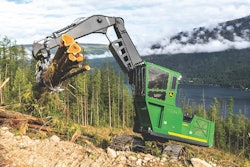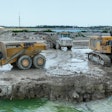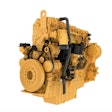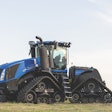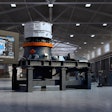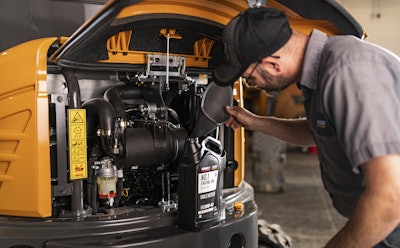
With tight deadlines and no time for downtime, construction equipment represents a critical asset for any construction project. To keep the operation running smoothly, it is essential to keep these machines functioning at their peak capacity. Without high-quality OEM engine oils and filters, operators run the risk of costly and time-consuming engine maintenance or failures.
Due to today’s highly efficient and powerful engines, construction machines require high-performance oils that support extended drain intervals and heavy-duty protection filters that can withstand rigorous construction site conditions. Engine oils with longer drain intervals further contribute to more efficient operations by allowing operators to go longer between oil changes and thus operate for longer periods of time. By strategically combining the appropriate OEM engine oil with genuine filters, construction professionals can significantly elevate the performance, longevity and reliability of their construction machinery.
Moreover, improved equipment performance not only speeds up construction processes and projects but also contributes to higher-quality work on the jobsite.
Improve your Engine Health with Genuine Solutions
When it comes to taking care of your engine, using the right engine oil tailored to the specific needs of your equipment ensures proper lubrication and temperature regulation. This mitigates friction and wear on critical components of the machine and provides protection against hotter temperatures and higher pressures. When paired with genuine oil filters, these benefits are further amplified to help your equipment maintain performance for the job ahead.
Genuine filters protect your engine against accumulating particles, such as combustion residue, wear residue and dust, that can have an abrasive effect on your engine's rotating and moving parts. To keep the oil clean, filters effectively trap and remove these harmful particles from circulating and causing potential damage to the engine, maintaining optimal oil quality.
To help construction professionals meet the unique demands of construction machinery, manufacturers like CASE Construction Equipment offer an advanced portfolio of OEM lubricant options like No.1 Engine Oil and genuine engine oil filters that are engineered, tested and proven to excel in the toughest conditions, from long hours of run time to challenging terrain and heavy loads.
Over time, reduced wear and tear from proper lubrication and filtration leads to substantial cost savings as a result of fewer unplanned maintenance interruptions and less costly repairs.
Tips for Engine Oil and Filter Selection
There are numerous risks associated with using the wrong type of engine oil in your machine. To avoid any equipment malfunctions or inefficiencies, here are some tips to remember when making your product selection:
- Check the manufacturer recommendations: Equipment owners should always consult the manufacturer’s guidelines and specifications for their construction machinery. Each machine's manual outlines critical information, such as capacities, the ideal type of oil to use, viscosity grade, performance standards and suggested service intervals.
- Consider the equipment’s operating conditions: Consider the environment and conditions your construction machinery operates in or will be exposed to. Factors such as temperature variations, workload and terrain should influence your choice of engine oil. Make sure to select an engine oil that performs well under these conditions.
- Evaluate drain intervals: Generally, construction equipment can run for up to 300 hours between engine oil change intervals. In terms of service, engine oils with extended drain intervals are specially formulated to endure longer periods of use without compromising performance. When you opt for fluids with this capability, you choose less downtime and reduced maintenance with more time between fills.
- Choose the right viscosity grade: A fluid's viscosity is determined by its thickness and its ability to flow at different temperatures. Your engine oil should have the appropriate viscosity rating for the temperature range your equipment operates in. By choosing oil with the right viscosity, you ensure proper lubrication during both high-temperature and cold-start operations. For instance, thinner oils work best at colder temperatures, while thicker fluids are recommended at warmer temperatures.
- Refer to API ratings: Get familiar with API (American Petroleum Institute) ratings, which indicate the oil's performance level and suitability for various applications. Look for an engine oil that meets or exceeds the industry-standard API requirements and has tighter tolerances than standard industry specs. CASE lubricants also come with an additional quality label, the Material Standards (MAT) specifications. MAT specs are extensively tested to provide maximum engine protection, shear stability, and corrosion and deposit control.
- Prioritize quality over price: While cost is an important consideration, prioritizing OEM spec engine oil helps to ensure a machine operates as efficiently as possible throughout its lifetime. It also ensures the machine stays on the recommended oil change and maintenance schedule.
- Seek professional advice: If you are unsure about the best oil option for your equipment engine, seek expert advice from the parts and service technicians at your OEM equipment dealer. Their knowledge and experience can guide you to make an informed decision based on your machinery requirements.
CASE Construction Equipment.
Oil filters are another important factor in keeping your machine in top shape. A good filter extends the life of your engine by preventing contamination, leaks and engine damage. When evaluating the quality of filters, consider the following components:
- Filter design: Consider flow rate, size and compatibility with the specifications of your machine when looking for a filter with a design optimized for heavy-duty construction applications. Filters with smooth ends and corners resist pressure cracks and fluid leakage.
- Baffle: A well-designed and high-strength baffle helps maintain the filter shape and seal for increased protection. Larger inlet openings also contribute to ensuring adequate oil flow. On the contrary, flat, flexible baffles may contract or crack under stress.
- Seal integrity: A heavy-duty seal provides a critical barrier directly between the element and baffle and can withstand varying temperatures and pressures. The anti-drain back seal ensures contaminants and dirty fluid cannot reenter your oil after engine shutdown. Rubber seals offer a tight, even, reliable seal while seals made out of material like cardboard may leak or deteriorate.
- Filter media: Look for a filter with high-quality media capable of capturing and retaining contaminants of various sizes, such as debris, dirt and particles. Filters made of synthetic, high-capacity media provide superior filtration efficiency and durability. CASE Genuine Engine Oil Filters feature high-capacity MicroLoc™ synthetic media. When compared to paper-based media, MicroLoc synthetic media is 70% more efficient in filtering critical contaminants because the fibers are smaller, resulting in smaller pores for finer filtration.
- Spring quality: A strong and long-lasting spring keeps the filter properly seated and functional. Furthermore, the robust, heavy-gauge wire spring ensures strong seal pressure. The spring's wide diameter also provides optimal support and prevents the filter from rocking during machine operation.
Overall, from proper engine lubrication to filtering harmful engine oil contaminants, investing in these two components is key to maintaining top functionality and prolonging the equipment’s operational life, thereby minimizing downtime and optimizing productivity on the jobsite.
For the ultimate engine protection combination, make sure to match high-quality engine oil with the proper oil filter. Visit your OEM dealership to learn how to protect your equipment investment with genuine engine protection lubricants and filters that meet your equipment’s specifications and operational needs.
